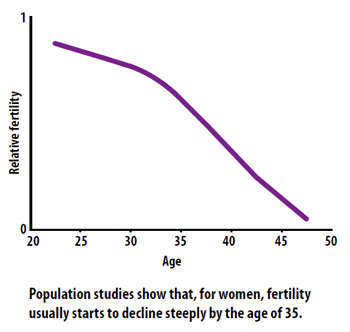Sperm recovery is the first goal in the success of a vasectomy reversal procedure. We all know the ultimate measure of success in vasectomy reversal procedure is a pregnancy. There are several factors affecting pregnancy in vasectomy reversal procedures, and these factors are outlined here.
1. A pregnancy involves male and female partners. If both of the count and quality of sperm after vasectomy reversal surgery are good, female fertility factors may play an indirect role in pregnancy failure.
A woman’s age affects her fertility. The decline in fertility begins to accelerate after 35. Advanced maternal age is a common reason for vasectomy reversal failure. Therefore, female partners age >35 years old should consider an evaluation to determine if they have adequate fertility before a vasectomy reversal is undertaken.
This evaluation panel of fertility usually includes
- Follicle-Stimulating Hormone (FSH) and estradiol levels at a menstrual cycle day 3.
- Anti-Mullerian Hormone (AMH) levels.
- Assessment of menstrual regularity.
- Hysterosalpingogram
2. Up to 60% of men with vasectomies develop antisperm antibodies in their body, which may impair fertility. Antisperm antibodies are usually assessed >6-12 months after the vasectomy reversal if no pregnancy has ensued.
3. A man may have abnormal sperm quality even before the vasectomy, especially in men without prior paternity. This could be a reason for pregnancy failure.
4. A number of men fail who have been placed on testosterone replacement before vasectomy reversal procedure, and they continue to use it afterwards. Testosterone is a very effective form of male birth control, effectively stopping sperm production.
5. If an epididymal blowout has occurred in both sides of vas deferens before the vasovasostomy procedure, the vasectomy reversal will likely fail. In this case, an epididymovasostomy would need to be performed.
6. Not only is epididymis a “storage site” or, but also is where sperm mature. In certain patients, their epididymis is adversely affected after the vas deferens has been blocked for a long time. In these patients, sperm counts may be normal, but sperm functions (movement and penetration ability) may be poor after vasectomy reversal. Most patients will gradually recover from epididymal dysfunction.
7. Sometimes, scar tissue develops at the site of anastomosis, causing a blockage and late failure. It may be treated with anti-inflammatory medication or could consider repeating vasectomy reversal procedure.





